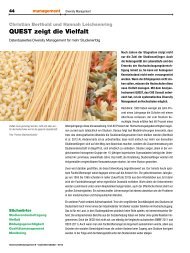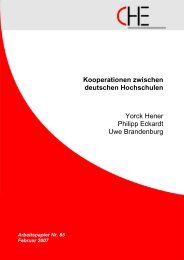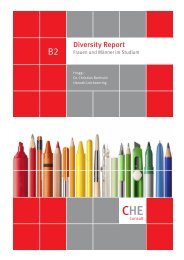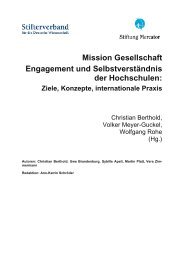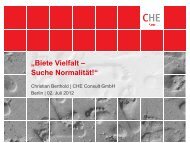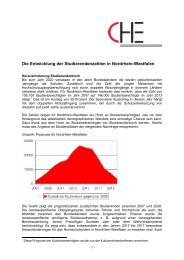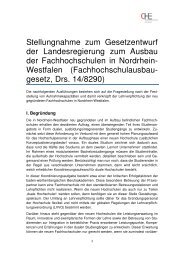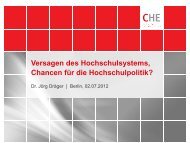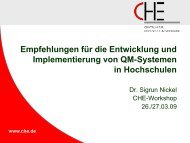Considerations in regards to the survey tool memo - CHE Consult
Considerations in regards to the survey tool memo - CHE Consult
Considerations in regards to the survey tool memo - CHE Consult
Create successful ePaper yourself
Turn your PDF publications into a flip-book with our unique Google optimized e-Paper software.
Moni<strong>to</strong>r<strong>in</strong>g Exchange Mobility Outcomes<br />
Without a doubt, <strong>in</strong>ternationalisation is currently<br />
en vogue: Especially <strong>in</strong> <strong>the</strong> higher education sec<strong>to</strong>r<br />
efforts are be<strong>in</strong>g made <strong>to</strong> implement <strong>in</strong>ternationalisation<br />
strategies <strong>in</strong> manifes<strong>to</strong>s, strategy plans and<br />
university profiles. National and European <strong>in</strong>stitutions<br />
give massive f<strong>in</strong>ancial support <strong>to</strong> <strong>the</strong>se developments.<br />
The ERASMUS exchange programme alone<br />
has a volume of 7bn Euro (programmes from 2007 -<br />
2013). But what exactly are <strong>the</strong> reasons for promot<strong>in</strong>g<br />
<strong>the</strong> <strong>in</strong>ternationalisation of education?<br />
The <strong>in</strong>ternationalisation of teach<strong>in</strong>g is unanimously<br />
considered “good”. Internationalisation professionals<br />
mostly work on <strong>the</strong> basis of a concept of <strong>in</strong>ternationalisation<br />
that is reflected <strong>in</strong> e.g. Jane Knight‘s<br />
def<strong>in</strong>ition (Knight, 1993), which characterises <strong>the</strong><br />
<strong>in</strong>ternationalisation of <strong>the</strong> higher education sec<strong>to</strong>r <strong>in</strong><br />
four ways:<br />
- As a process<br />
- As a resource<br />
- As a means <strong>to</strong> align <strong>the</strong> higher education system<br />
with <strong>in</strong>ternational standards and also as<br />
- A chance <strong>to</strong> create a system that is open <strong>to</strong> a globalised<br />
environment (separate from <strong>the</strong> globalisation<br />
process).<br />
In <strong>the</strong>ir paper The End of Internationalization?, published<br />
<strong>in</strong> 2011, Uwe Brandenburg and Hans de Wit critically<br />
reflect on <strong>the</strong>se generally undisputed presumptions<br />
(Brandenburg & de Wit, 2011). They reject<br />
Knight’s def<strong>in</strong>tion and claim that <strong>in</strong>ternationalisation<br />
and globalisation are used <strong>in</strong> <strong>the</strong> current debate as<br />
antagonistic term<strong>in</strong>i, whose respective mean<strong>in</strong>gs are<br />
contentious or, ra<strong>the</strong>r, have become devalued. One<br />
often says globalisation, when one actually means<br />
neoliberalism, <strong>the</strong> currently predom<strong>in</strong>at<strong>in</strong>g economic<br />
paradigm.<br />
Especially <strong>in</strong> recent days, as de Wit argues <strong>in</strong> his<br />
critical comment from 2011 (de Wit, 2011), ever new<br />
labels for <strong>in</strong>ternationalisation are <strong>in</strong>troduced <strong>to</strong> <strong>the</strong><br />
debate, e.g. <strong>the</strong> term “comprehensive <strong>in</strong>ternationalization”,<br />
which John Hudzik (Hudzik, 2011) presented<br />
<strong>in</strong> <strong>the</strong> same year. De Wit po<strong>in</strong>ts out that this new label<br />
did not conta<strong>in</strong> any new dimensions of <strong>in</strong>ternationalisation<br />
but <strong>in</strong>stead relates back <strong>to</strong> <strong>the</strong> commonly<br />
established def<strong>in</strong>ition by Knight (Knight, 1993). In<br />
<strong>regards</strong> <strong>to</strong> fur<strong>the</strong>r def<strong>in</strong>itions <strong>the</strong> tendency <strong>to</strong>wards<br />
repetitions and a lack <strong>in</strong> content is similarly noticeab-<br />
www.<strong>memo</strong>-<strong>to</strong>ol.net<br />
le: „There is no o<strong>the</strong>r conclusion but that <strong>the</strong>se labels<br />
are tau<strong>to</strong>logies, us<strong>in</strong>g different words <strong>to</strong> say <strong>the</strong> same<br />
th<strong>in</strong>g even if <strong>the</strong> repetition does not actually make <strong>the</strong><br />
mean<strong>in</strong>g even clearer.” (de Wit, 2011)<br />
Brandenburg and de Wit demand for <strong>the</strong> term or<br />
ra<strong>the</strong>r for <strong>the</strong> concept Internationalisation <strong>to</strong> be filled<br />
with new mean<strong>in</strong>g, for its value <strong>to</strong> be re<strong>in</strong>stated and<br />
fur<strong>the</strong>rmore <strong>to</strong> question, which means and activities<br />
are utilised as part <strong>in</strong> <strong>the</strong> <strong>in</strong>ternationalisation processes<br />
of HEIs and why <strong>the</strong>se <strong>in</strong> particular. Although <strong>the</strong><br />
future of HEIs will doubtlessly have a global or, as <strong>the</strong><br />
case may be, <strong>in</strong>ternational character: “Called for is a<br />
common commitment at <strong>the</strong> <strong>in</strong>stitutional and personal<br />
level of how we and our students will be prepared<br />
<strong>to</strong> live and work <strong>in</strong> a global community” (Brandenburg<br />
& de Wit, 2011, p. 17).<br />
Hereby <strong>the</strong> concern is not only for <strong>the</strong> scientific, but<br />
also for <strong>the</strong> cultural context: In this regard, <strong>the</strong> acquisition<br />
of <strong>in</strong>tercultural competencies has <strong>to</strong> be<br />
seen as an important strategy for <strong>the</strong> preparation for<br />
liv<strong>in</strong>g and work<strong>in</strong>g with<strong>in</strong> a globalised world whose<br />
complexity should not be underestimated and was<br />
described by Hofstede (Hofstede, 2009). Intercultural<br />
competencies are <strong>the</strong>refore an attribute of <strong>in</strong>creas<strong>in</strong>g<br />
relevance <strong>to</strong> educational policies and are also<br />
a decid<strong>in</strong>g fac<strong>to</strong>r <strong>in</strong> <strong>the</strong> selection of new employees.<br />
The large amount of competency measurement <strong>to</strong>ols<br />
or scales employed for (<strong>in</strong>ternational) personnel development,<br />
which directly refer <strong>to</strong> <strong>the</strong> measurement<br />
of <strong>in</strong>tercultural competencies, document <strong>the</strong>ir importance<br />
(see, e.g. (Black, Mendenhall, & Oddou, 1991)<br />
(Cui & Awa, 1992) (Cui & Awa, 1992) (Kühlmann &<br />
Stahl, 1998) (Bird & Osland, 2004)).<br />
In his paper Was heißt ,Interkulturelle Kompetenz‘?<br />
Perspektiven für die <strong>in</strong>ternationale Personalentwicklung,<br />
Jürgen Bolten (Bolten, 2007) considers different<br />
approaches <strong>to</strong> def<strong>in</strong><strong>in</strong>g, measur<strong>in</strong>g and advanc<strong>in</strong>g <strong>in</strong>tercultural<br />
competencies. He notes:<br />
Accord<strong>in</strong>gly, process models understand <strong>in</strong>tercultural<br />
competencies as a holistic <strong>in</strong>teraction of <strong>in</strong>dividual,<br />
social, technical and strategic actions <strong>in</strong> <strong>in</strong>tercultural<br />
contexts. “Intercultural competence“ is hereby shown<br />
<strong>to</strong> be a term for a synergetic process, which <strong>the</strong>refore<br />
cannot be limited <strong>to</strong> <strong>the</strong> area of soft skills, i.e. personal<br />
or social aspects. As <strong>the</strong> term encompasses me-<br />
2



